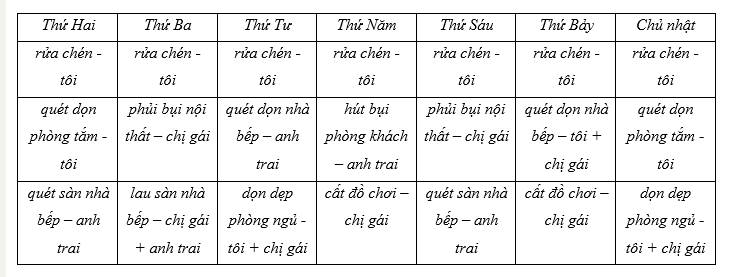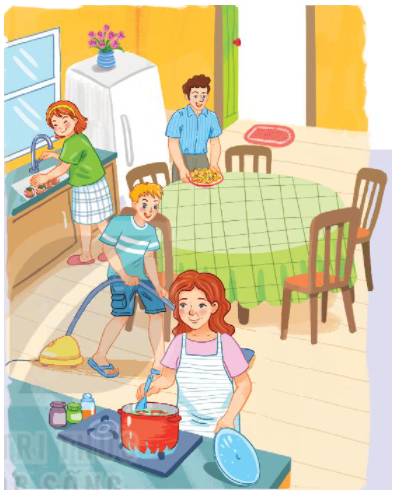Hãy nhập câu hỏi của bạn vào đây, nếu là tài khoản VIP, bạn sẽ được ưu tiên trả lời.

I think my partner’s brother should do more chores because he is quite lazy he is doing the least housework in her family. Her mother should do fewer because she is doing too much. She needs to be relaxed.

A: What chores does your brother do?
(Anh trai của bạn làm những việc nhà gì?)
B: He cleans the kitchen, vacuums the living room, mops the kitchen floor, and sweeps the kitchen floor.
(Anh ấy quét dọn nhà bếp, hút bụi phòng khách, lau sàn nhà bếp, và quét sàn nhà bếp.)
A: How often does he clean the kitchen?
(Anh ấy quét dọn nhà bếp bao lâu một lần?)
B: He does it once a week, on Wednesdays.
(Anh ấy làm việc đó mỗi tuần một lần, vào các ngày thứ Tư.)

Anna: Nam, why do you think children should do housework?
(Nam, tại sao bạn nghĩ trẻ em nên làm việc nhà?)
Nam: Because (1) doing housework helps them develop life skills.
(Vì làm việc nhà giúp các em phát triển các kỹ năng sống.)
Anna: It’s true. Life skills such as cooking, cleaning or taking care of others are really necessary for kids when they grow up.
(Điều đó đúng đấy. Các kỹ năng sống như nấu ăn, dọn dẹp hay chăm sóc người khác thực sự cần thiết cho trẻ khi lớn lên.)
Nam: Yes, we should all have these basic life skills to be adults.
(Đúng vậy, tất cả chúng ta nên có những kỹ năng sống cơ bản này để trở thành người lớn.)
Anna: Now Minh, why do you think children shouldn’t do housework?
(Giờ thì Minh, tại sao bạn nghĩ trẻ em không nên làm việc nhà?)
Minh: I think kids are kids. (2) They may break or damage things when doing housework.
(Mình nghĩ trẻ em là trẻ em. Các em nên được dành nhiều thời gian chơi khi chúng còn nhỏ.)
Nam: I don’t agree with you. I’m afraid too much playtime isn’t good for children.
(Mình không đồng ý với cậu. Mình e rằng thời gian chơi quá nhiều sẽ không tốt cho trẻ em.)
Anna: Well, thank you both for sharing your ideas. They are very useful for my project.
(Được rồi, cảm ơn cả hai đã chia sẻ ý kiến của mình. Chúng rất hữu ích cho dự án của mình.)

1. The mother is cooking.
The dad is preparing the food.
The son is vacuuming.
The daughter is washing the tomatoes.
2. I think that they are happy because they are smiling.

Tạm dịch:
Sam
+ hút bụi phòng khách - 3 lần 1 tuần
+ rửa bát - mỗi buổi sáng
+ cất quần áo - 2 lần 1 tuần
Alice
+ dọn dẹp phòng ngủ - mỗi ngày
+ phủi bụi đồ đạc - 1 hoặc 2 lần 1 tháng
Thông tin:
Sam: I vacuum the living room, and I do the dishes.
(Tôi hút bụi phòng khách và rửa bát.)
Lisa: How often do you vacuum the living room?
(Bạn thường hút bụi phòng khách bao lâu 1 lần?)
Sam: Three times a week.
(Ba lần một tuần.)
Lisa: And how often do you do the dishes?
(Và bạn thường rửa bát bao lâu 1 lần?)
Sam: Every morning, after breakfast.
(Mỗi sáng, sau khi ăn sáng.)
Lisa: Do you do anything else?
(Bạn còn làm gì nữa không?)
Sam: Oh, yeah. I put away my clothes when my mom does the laundry. That's twice a week on Wednesdays and Saturdays.
(Ồ, vâng. Tôi cất quần áo khi mẹ tôi giặt giũ. Việc này thì hai lần một tuần vào thứ Tư và thứ Bảy.)
Sam: Alice tidies her bedroom every day. She's very messy.
(Alice dọn dẹp phòng ngủ mỗi ngày. Em ấy rất bừa bộn.)
Lisa: Oh, is that all?
(Ồ, vậy thôi à?)
Sam: Well, sometimes she dusts the furniture. Maybe once or twice a month. She hates doing chores.





Should
Shouldn’t
Doing housework helps them develop life skills.
Kids should be given plenty of playtime when they are young
Doing housework teaches them to take responsibilities
They need more time to study and do homework
Doing housework helps strengthen family bond
They may break or damage things when doing housework